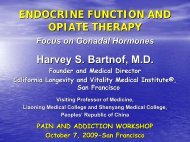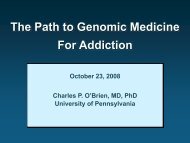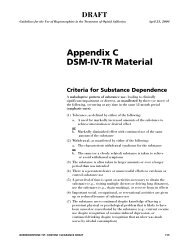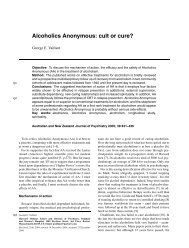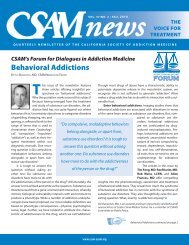SAN FRANCISCOMEDICINE - California Society of Addiction ...
SAN FRANCISCOMEDICINE - California Society of Addiction ...
SAN FRANCISCOMEDICINE - California Society of Addiction ...
Create successful ePaper yourself
Turn your PDF publications into a flip-book with our unique Google optimized e-Paper software.
In November 2004, Proposition 63<br />
(the Mental Health Services Act, or MHSA)<br />
passed in the state <strong>of</strong> <strong>California</strong>, allowing<br />
the <strong>California</strong> Department <strong>of</strong> Mental<br />
Health the opportunity to provide funding,<br />
personnel, and other resources to public<br />
mental health programs. MHSA funds are<br />
also used to reduce barriers to access and<br />
address stigma associated with mental<br />
illness, while promoting prevention, early<br />
intervention, and the development <strong>of</strong> integrated<br />
educational programs that support<br />
wellness and recovery.<br />
In 2008, with MHSA grant funding,<br />
the U.C. Davis Center for Reducing Health<br />
Disparities partnered with the U.C. Davis<br />
Departments <strong>of</strong> Psychiatry and Behavioral<br />
Sciences, Internal Medicine, and Family<br />
and Community Medicine to develop the<br />
Integrated Medicine Psychiatry and Residency<br />
Training (IMPART) initiative. The<br />
primary objective for IMPART is to provide<br />
IMP and FMP residents with sixty months<br />
<strong>of</strong> integrated, culturally and linguistically<br />
competent training in psychiatry and either<br />
family medicine or internal medicine. The<br />
core principles <strong>of</strong> MHSA (which include<br />
reducing health disparities with a focus on<br />
patient- and family-centered, culturally tailored,<br />
and targeted treatment that is largely<br />
dependant on one’s sense <strong>of</strong> personal recovery)<br />
are incorporated into the IMPART<br />
curriculum and recruitment process. Each<br />
graduate from these five-year programs<br />
will be board eligible in either family medicine<br />
or internal medicine and psychiatry.<br />
Many <strong>of</strong> the residents have a strong interest<br />
in working with underserved populations<br />
and in teaching students the importance<br />
integrating medicine and psychiatry, particularly<br />
in the primary care setting.<br />
Waiver 1115<br />
Section 1115 <strong>of</strong> the Social Security Act<br />
allows the Secretary <strong>of</strong> Health and Human<br />
Services to authorize pilot or demonstration<br />
projects that can help promote the<br />
existing objectives <strong>of</strong> statewide Medicaid<br />
programs. Section 1115 waivers are generally<br />
used to allow states to institute demonstration<br />
projects and provide federal<br />
funding that would not normally be eligible<br />
under federal law.<br />
The <strong>California</strong> Department <strong>of</strong> Health<br />
Care Services (DHCS) is now in the process<br />
<strong>of</strong> significantly revising its 1115 waiver for<br />
hospital financing and uninsured care to<br />
change the manner in which Medi-Cal provides<br />
services to some <strong>of</strong> its most medically<br />
vulnerable beneficiaries. This restructuring<br />
includes the development or realignment<br />
<strong>of</strong> organized delivery systems <strong>of</strong> care for<br />
specific high-risk populations, including<br />
those with SMI. Various technical work<br />
groups have been established to focus on<br />
specific populations that have been identified<br />
as at high risk for poor health outcomes<br />
in the current service delivery system. One<br />
such group is comprised <strong>of</strong> adults with SMI<br />
and/or substance abuse disorders.<br />
As outlined previously, those with SMI<br />
have a much shorter life span when compared<br />
to those without SMI. There is clear<br />
evidence that improving the integration <strong>of</strong><br />
primary care, mental health, and substance<br />
abuse services also improves the overall<br />
health status for this vulnerable population.<br />
6 Before the end <strong>of</strong> August 2010, the<br />
collective input from several work-group<br />
sessions will be used to develop clinical and<br />
educational strategies that will advance<br />
medical and psychiatric care for Medi-Cal<br />
recipients with SMI.<br />
The CPCI, IMPART, and Waiver 1115<br />
programs are just a few examples <strong>of</strong> how<br />
models <strong>of</strong> integration and statewide innovation<br />
can affect positive change in individuals<br />
and families. While the issue <strong>of</strong> better<br />
coordination and integration <strong>of</strong> mental<br />
health and physical health care in persons<br />
with mental and substance abuse disorders<br />
is relevant to the overall redesign <strong>of</strong> health<br />
care systems, the integration <strong>of</strong> effort on<br />
the part <strong>of</strong> the public agencies responsible<br />
for child, family, adult, and elderly mental<br />
health—child welfare, special education,<br />
primary health care, mental health, juvenile<br />
or criminal justice, and substance abuse—<br />
is <strong>of</strong> particular relevance to vulnerable<br />
populations, including the poor, uninsured,<br />
children and the elderly, and immigrants.<br />
Although we are still in the early stages <strong>of</strong><br />
developing, implementing, and evaluating<br />
widespread primary care, mental health<br />
collaborative care, and educational models,<br />
we are on the right path to building better<br />
care models that are responsive to the<br />
needs <strong>of</strong> diverse populations.<br />
Robert M. McCarron, DO, is president <strong>of</strong><br />
the Association <strong>of</strong> Medicine and Psychiatry<br />
and training director for the Internal Medicine<br />
and Psychiatry Residency program at<br />
the University <strong>of</strong> <strong>California</strong> Davis School <strong>of</strong><br />
Medicine.<br />
Sergio Aguilar-Gaxiola, MD, is a pr<strong>of</strong>essor<br />
<strong>of</strong> clinical internal medicine at the University<br />
<strong>of</strong> <strong>California</strong> Davis School <strong>of</strong> Medicine.<br />
He is the founding director <strong>of</strong> the UC Davis<br />
Center for Reducing Health Disparities and<br />
the director <strong>of</strong> the Community Engagement<br />
Program <strong>of</strong> the UCD Clinical Translational<br />
Science Center (CTSC). He is also cochair<br />
<strong>of</strong> the NIH’s Community Engagement Key<br />
Function Committee for the CTSA awards<br />
and the Immediate Past Chair <strong>of</strong> the Board<br />
<strong>of</strong> Directors <strong>of</strong> Mental Health America.<br />
Caitlyn Meltvedt is a Research Specialist<br />
for the departments <strong>of</strong> Internal Medicine and<br />
Psychiatry at UC Davis Medical Center. Her<br />
research focuses on quality improvement<br />
projects for medically underserved patients<br />
in Sacramento county.<br />
References<br />
1<br />
Whooley MA, Simon GE. Managing<br />
depression in medical outpatients. N Engl<br />
J Med. 2000; 343(26):1942-1950.<br />
2<br />
Colton CW, Manderscheid RW. Congruencies<br />
in increased mortality rates,<br />
years <strong>of</strong> potential life lost, and causes <strong>of</strong><br />
death among public mental health clients<br />
in eight states. Prev Chronic Dis. 2006.<br />
3(2):A42.<br />
3<br />
Jones DR, Macias C, Barreira PJ,<br />
Fisher WH, Hargreaves WA, Harding CM.<br />
Prevalence, severity, and co-occurrence <strong>of</strong><br />
chronic physical health problems <strong>of</strong> persons<br />
with serious mental illness. Psychiatric<br />
Serv. 2004. 55(11):1250-1257.<br />
4<br />
Servis M. Combined family practice<br />
and psychiatry residency training: A 10-<br />
year appraisal. Acad Psychiatry. 2005.<br />
29(5):416-418.<br />
5<br />
Servis ME, Hilty DM. Psychiatry and<br />
primary care: New directions in education.<br />
Harv Rev Psychiatry. 2000. 8(4):206-209.<br />
6<br />
Aguilar-Gaxiola S. Policy implications.<br />
In M. Von Korff, K. Scott, and O. Gureje (eds.),<br />
Global Perspectives on Mental Disorders and<br />
Physical Illness in the WHO World Mental<br />
Health Surveys. 2009. New York: Cambridge<br />
University Press.<br />
www.sfms.org June 2010 San Francisco Medicine 17



